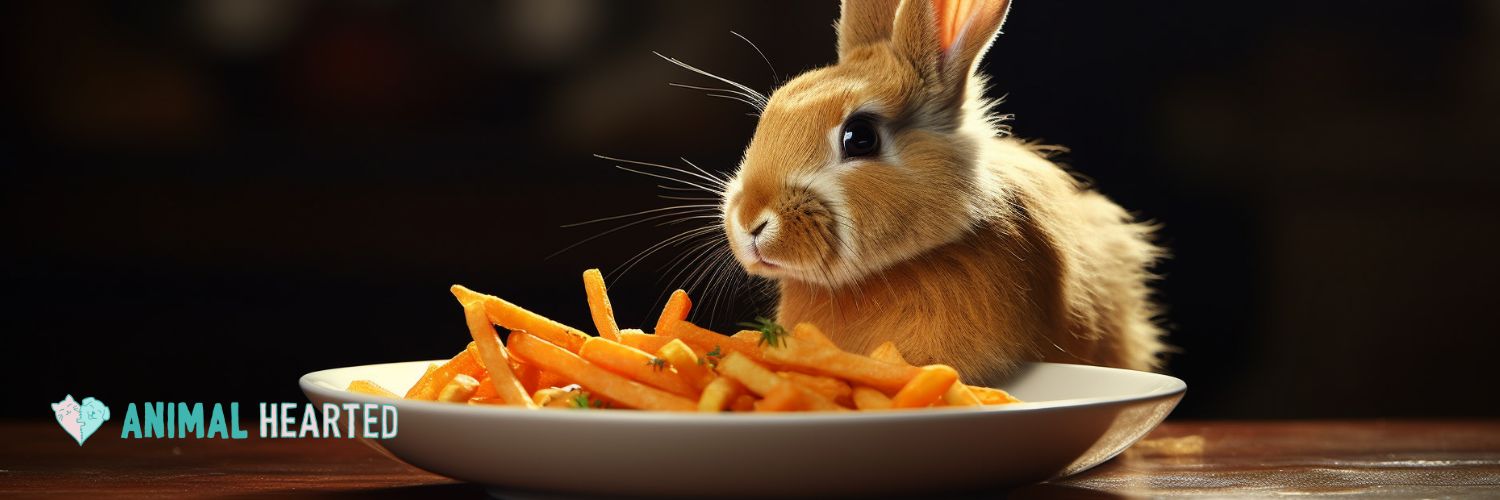shelter pets in need
Each order helps pets in need

When considering the diet of your pet rabbit, you might wonder about the safety of various human foods, such as French fries. Although French fries are a staple snack for many people, they are not a healthy option for your bunny.
Despite being made from potatoes, which in their raw form could be part of a rabbit's diet, the additional ingredients and cooking process make French fries dangerous for rabbits to consume.
Feeding your rabbit French fries can lead to several health issues, including digestive problems and obesity. Rabbits have specific dietary needs that are vastly different from humans’, and their digestive systems are not designed to handle the high fat, salt, and starch content found in French fries.
It is important to stick to a diet that suits their nutritional requirements, which primarily consist of hay, fresh vegetables, and a small number of pellets. How long your rabbits live depends on what they consume.
Optimal nutrition is fundamental to keeping your rabbit healthy. Knowing what makes up a balanced diet for your furry friend is the key to enabling a long, vibrant life.
Fiber is the cornerstone of rabbit nutrition. Your rabbit's digestive system relies on high amounts of fiber, which is primarily found in hay and grass.
These are not just fillers; they keep the gut moving and prevent dangerous blockages. Ensure your rabbit has access to fresh hay at all times, as it's crucial for their dental and digestive health.
Rabbits need a diet tailored to their unique requirements. Besides fiber, rabbit pellets provide essential nutrients in concentrated form, but be sure to choose high-quality rabbit pellets without excessive fillers.
Mix in leafy greens and fresh vegetables for variety and additional vitamins. Water is a must for hydration. While fruits and commercial treats might be appreciated, they should be given sparingly due to high sugar content. Always strive for a balanced diet to support their well-being.
Feeding your bunny french fries can lead to serious health issues. These processed foods are packed with elements that rabbits' sensitive digestive systems aren't equipped to handle.
French fries are loaded with starch, fat, and oil, all of which can wreak havoc on your rabbit's digestive system. The high levels of these components can lead to diarrhea and gastrointestinal stasis, conditions that are particularly dangerous for rabbits due to their complex guts.
Over time, the high-fat and high-sodium content in french fries can contribute to obesity and heart disease in rabbits. Unlike humans, rabbits do not gain any nutritional value from such processed foods.
The trans fats and toxins typically found in these fried snacks are simply not meant for your rabbit's consumption.
While bunnies can't indulge in french fries, you've got a whole garden of healthy treats to offer them that are both safe and beneficial.
Offering your rabbit a variety of vegetables can spice up their diet beyond the basics. Leafy greens like romaine lettuce, parsley, cilantro, and beet greens are excellent choices that are rich in fiber and low in calories.
Remember, when it comes to fruits like apple and berries, they're a sweet treat, so serve them sparingly.
Your rabbit's diet should be primarily hay—the key to their well-being due to its high fiber content. Treats, whether they're vegetables or fresh fruits, should only be a small part of their diet to prevent bloating and gas.
While parsley and cilantro are good in small quantities, always introduce any new treat slowly to check your bunny's reaction.
If your bunny has snacked on something they shouldn't, like french fries, you'll need to be vigilant for signs of digestive distress. Keep an eye out for both subtle and overt changes in behavior and physical symptoms.
Your rabbit's gut is delicate, and symptoms like diarrhea or bloating can be red flags. If you notice your bunny's stomach is larger than usual, hard to the touch, or they show signs of pain (like hunching over), these could be signs of gastrointestinal diseases.
Check their litter for loose or watery stools, as this is a clear sign of digestive problems.
Unusual behavior in your rabbit, such as lethargy or decreased appetite, often accompanies digestive distress. If they're not rushing over for their favorite greens or are unusually still, it could indicate discomfort or another issue.
Be particularly mindful of any sudden changes, as rabbits often hide their illness, and these may be the first signs of digestive issues you'll spot.

When caring for your bunny, knowing how to meet their dietary needs is essential for a healthy diet. Proper nutrition involves a balance of fresh vegetables, high-quality pellets, and unlimited access to water.
Crafting a daily meal plan for your rabbit ensures they get a balanced diet. Start with high-quality rabbit pellets—a small portion daily, typically 1/4 cup per 4 pounds of your rabbit's body weight, provides essential nutrients.
Your rabbit's diet should be fiber-rich, so complement those pellets with unlimited access to hay. Include a variety of fresh vegetables, focusing on leafy greens, which are crucial for your bunny's health. Moderation is key; for treats, think a slice of apple or a few blueberries a few times a week to prevent overfeeding.
Just as important as their diet, exercise plays a vital role in your rabbit's health. Ensure your furry friend has only the best rabbit hutches to ensure they have ample space and time to hop around every day.
Keep them engaged with enrichment activities like puzzle feeders to promote mental stimulation. Regular movement helps prevent obesity and keeps their digestive system running smoothly.
Always provide plenty of water to complement a day filled with activity and good nutrition.
Leave a comment